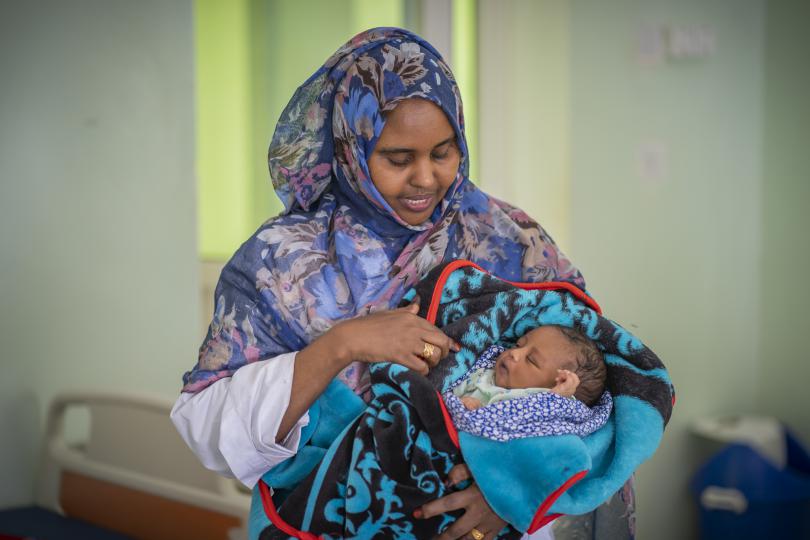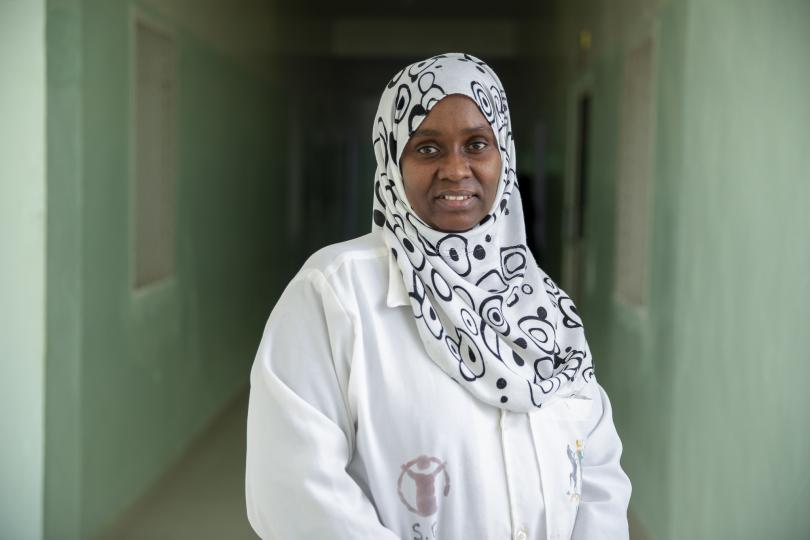BETWEEN ME, MAMA SAFIA AND BISHARO, IT IS NOT LESS THAN 10,000 BABIES,’’ -MEET SAFIA, FARHIA AND BISHARO, MIDWIVES IN SOMALIA.

Written by: Said Isse, Advocacy, Campaigns, Communication and Media manager Photos: Said Fadhaye, and Kate Stanworth/ Save the Children
Interviews: Kate Stanworth and Said Isse
Today, under the theme of “Follow the Data: Invest in Midwives,” we celebrate with three midwives who work in a hospital in Eastern Somalia’s Puntland region. Safia, Farhia and Bisharo have been working in Gardo General Hospital for a very long period and have seen the transformation of the hospital from a Health centre to one of the largest hospitals in Somalia, thanks to funds from the United Kingdom.
Safia is a 59-year-old midwife. Today, she helped Amin, a baby boy, take his first breath in this world. He is one of the thousands of babies Safia has delivered over the nearly 40 years she has been working as a midwife in the town of Gardo in Somalia.
Baby Amin’s mother arrived at Gardo hospital after community health workers in her village advised her to go to the hospital as she complained about sleeplessness and lack of appetite. Her neighbors told her that maternity section of Gardo General hospital is free of charge.
"I am happy that I'm doing this job. Many who were born in the hospital meet me in the streets, but I can't recognize each of them," Safia told me.
"But as long as they recognize me, I'm happy."
Safia has lived in Gardo all her life. When she was just 18, she trained as a midwife to support the local health facility in Gardo, which is now Gardo Hospital.
"When I started working here, Gardo was a tiny village. It is now almost 40 years. The health service was fragile and traditional birth attendants were very popular here," Safia said.
The hospital supports thousands of mothers and their children every year. Today, it is the largest hospital in the region and provides services to over 300,000 people. Before the maternity section was up and running, mothers would traditionally birth at home, with support from untrained attendants. As a result, the maternal and child mortality rate in the area was high, and birthing mothers were at constant risk of losing their own lives or that of their babies.
Across Somalia, Save the Children has supported nearly 3 million people, including over a million children, with live-saving health and nutrition interventions. Save the Children has also provided comprehensive support and training to 2,851 ministry of health staff across 234 fixed public health facilities and 162 mobile sites.
UK Government support
The UK Government supports the maternity section of the Gardo Hospital, where Safia works. Jama Mohamed Da’ar, Health programme manager, working for Save the Children, says: "Before UK support, there was no maternity and child health section in the hospital."
"When we started, home delivery was very high. People were using traditional midwives, who often don't have the skills and knowledge and sometimes would harm the babies or others as a result."
Farhia and Bisharo.

In this hospital, many other midwives share Safia’s aspiration to support babies and their mothers. Farhia and Bishara are colleagues of Safia in the maternity section. They have worked with her for about 12 years now.
Farhia has been working as a midwife in Gardo General Hospital since 2007. She studied midwifery in Bosaso, one of the main towns in Puntland, and she is now the head of maternity in the hospital.
"I delivered 30 children, and maybe I will deliver 26 or 27 more. So how can I remember the total number of children I delivered since 2007?
"I can't tell the exact figure, but I can say between me, mama Safia and Bisharo, it is not less than 10,000 babies because we have been here since 2007.
"Mama Safia, come here before us. Her story is inspiring to every one of us.

Bisharo has been working in the hospital for 18 years as a midwife. She has seen significant improvements in the service offered since starting work here. Initially, people had to pay for medicines and treatments, but since the Save the Children project started, they have been offered free. As a result, she has seen an increased demand for the service, with mothers choosing to come here from miles around rather than risk a potentially unsafe birth with traditional midwives, who don't have professional knowledge, skills or resources. She has also received training, including in family planning, for which she travelled to Kenya, supported by Save the Children.
"Here there is a big difference between the traditional and the professional midwives. The traditional ones don't have the capacity and skills to provide medical support to birthing mothers and their babies. For example, the traditional birth attendants are not able to stop bleeding and can't measure blood pressure. Also, access to medicines are a big issue.. When mothers come here, they can monitor everything. The service is improving a lot for both the mother and child.
“I like my job as I always had the hope and passion for being a midwife. I am a mother of eight children, four boys and four girls. Four were born in this hospital, and since I worked here, I delivered my children here.
“Over the last few years, there have been significant improvements in the hospital, like the inclusion of caesareans, and since we don't charge money, there is an increase in demand for delivery service.




